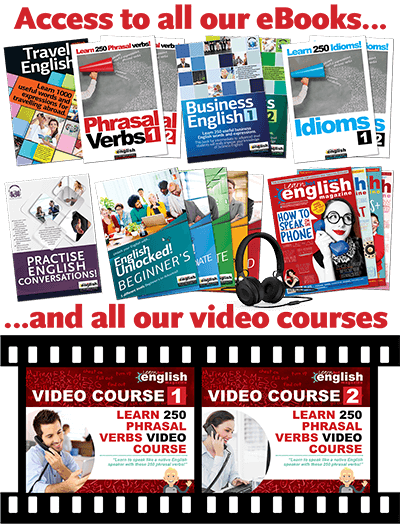31 great tips on how to improve your English!
Here are 31 of our top tips on how to improve your English (or just about any language!).

1, Read for 10 minutes
With just 20 minutes a day, you can really improve your English. Read for 10 minutes (an online article, a graded reader, etc.), and listen for 10 minutes (a YouTube video, the news, your favourite TV series, etc.). You’ll soon notice the difference!
2, Try to learn 10 English words every day.
In one week, you’ll have learnt 70, in a month about 300, and in a year over 3,000! The average British person has an active vocabulary of about 5,000 words. So, it won’t take you long to learn all the most important terms in English.
3, Don’t worry about making “mistakes”.
Even native speakers get things wrong when speaking. It happens when you’re talking fast.
4, Listening is the key to language learning.
So, listen to English as much as you can! Just 10 minutes a day (but every day!) is enough to really help you improve your listening ability. Listening to English regularly will help you develop an ear for the language. Eventually, you’ll be able to distinguish words and sounds, and then you’ll start learning really quickly.
5, Keep it simple
There’s a very basic formula for learning a language. It’s: input (reading and listening) + practice (speaking and writing) = learning! It’s that simple!

6, Repeat
Repeat words after you hear them to help you memorise them. For improved learning, repeat whole sentences, phrases or expressions with the words in them. Do this three times for each word or expression so the words really get registered in your brain. This is particularly effective for words or expressions that are difficult to say. The more you repeat them, the easier they’ll become to say and remember.
7, Listen for Gist
When listening, don’t worry about understanding every single word. Focus on the general meaning and try to guess what the speakers are saying. This is what you do in your own language. Remember to listen for gist – a general understanding of what people are saying. It’s extremely difficult to hear or understand every single word – not even native speakers do that.
8, Simultaneous repetition
Improve your speaking with “simultaneous repetition”. Select a phrase or sentence in English from an audio file. Then, as the audio is playing, try to repeat the words at exactly the same time as the speaker. This is also a great way for memorising language and for improving your pronunciation.
9, Keep your own personal notebook
Build up your own personal dictionary of words and expressions that you like. Then, spend time learning them. Also, try to use these words and expressions when you’re speaking or writing.

10, Practise writing
This will develop your language skills. Use the LCCC method: Look, Cover, Copy, Check. First, choose a piece of text (a sentence or two, or a short paragraph). Look at it for a couple of minutes. Then cover it and try to copy it out again word for word. Finally, check your version against the original.
11, Reading is a great way to learn.
As you’re enjoying a book or article, lots of new words and expressions will flow into your brain. On top of that, you’ll see how the language fits together. And this will help with your understanding of grammar, language structures and collocation.
12, Relax and Learn
Listen to English when you’re relaxing, doing the cleaning or doing some exercise. Simply let the language flow in. Without even realising it, you’ll develop an ear for the language. Then, you’ll start learning really fast.
13, Memorise
Try to memorise short dialogues in English. Later, you can use the words, phrases or expressions from the dialogues in your own conversations.
14, Guess!
When reading, always try to guess the meaning of any words or expressions that you aren’t sure of. The more effort you make to work out the meaning of a word, the easier it’ll be for you to remember it!
15, Keep it interesting
Read what you’re interested in. This way you’ll be more motivated. For example, if you’re into cinema, read some movie reviews in English of films you’ve seen; or if you’re a sports fan, check out the sports section of an online English-language newspaper.
16, Repeat
Repeat difficult words, expressions and phrases over and over again until you can say them quickly and easily.
17, Write in English every day!
It’s good practice as it forces you to use the language you know. Also, you get to see where the gaps are in your knowledge. You could practise writing out stories or anecdotes. This would be good preparation for telling the stories later in conversation.
18, Watch your favourite TV series in English
TV series are great because they’re full of dialogue, with lots of useful language for spoken English.Watch your favourite films in English. As you already know what they’re about, it’ll be a lot easier for you to follow them and understand the dialogue.Always keep a notebook with you when you’re watching an English-language film or listening to something in English. Then, you can write down any useful words or phrases that you want to learn or remember.
19, Sing along to your favourite songs in English
This is a great way to improve your pronunciation. It’ll also help you remember lots of words, expressions and phrases!
20, Use cue cards
Write out words you want to learn on little cards and try to learn them during the day. Or, record them and listen to them on an MP3 player. Remember to put the words or expressions in sentences! This way, you’ll see which words go together.
21, Watch the news in English
After watching or reading the news in your language, try reading or listening to it in English. You’ll be surprised at how much you understand. The key is to read and listen to as much English as you can. It’s the best way to improve. You can read online articles, listen to songs, watch films, TV series, YouTube videos… the options are limitless.
22, Reward yourself
Treat yourself to something nice if you can learn 10 words a day. Say, “If I learn these 10 words by the end of the day, I’ll buy myself a bar of chocolate!” Set yourself bigger objectives (with nicer treats) for the month or year.
23, Use an English-to-English dictionary
Try to understand the definitions when looking up new words. This will help you to start thinking in English.
24, Get some rhythm
English has a rhythm to it. Listen to phrases or sentences and try to repeat them with the same intonation and rhythm. Remember, listening is extremely difficult. However, it comes with practice, and the more you listen to English, the easier it gets.
25, Don’t worry about making mistakes
It’s all part of the learning process. The most important thing is to read and listen a lot so you get a feel for the language. Then, you can start correcting yourself.
26, Consistency
Practise a bit every day: reading an article, listening to a song, chatting with an English-speaking friend, etc. Doing 10 or 20 minutes every day is far better than doing four hours just once a week.

27, Talk to yourself in English
This will help you improve your speaking fluency. Tell yourself what you’ve done, what you’re doing or what you’re going to do. It’s all good practice!
28, Use mnemonics*
To help you memorise difficult words. As part of this, you could…
a) draw a picture of the word;
b) create a funny sentence with it;
c) base a short story around it;
d) find a word that sounds or looks similar in your own language and make a connection between the two words…
*the study and development of systems for improving and assisting the memory.
29, Don’t focus too much on grammar.
Learning how structures are formed is useful for generating language. However, grammar alone will not help you communicate in a language. Instead, spend your time learning new words and expressions, or reading and listening to English, which is the best way to learn a language quickly and effectively.
30 Translate!
On a sheet of paper, create a table with two columns. Write useful expressions in English in the left-hand column, and the translation into your language in the right-hand column. Then, when you want to practise, cover up one of the columns. For example, cover up the English column and read over the sentences in your language. Can you translate them back into English? Or cover up the sentences in your language and read the sentences in English? Do you know how to say them in your language?
31 Speaking out loud
Saying words, expressions or sentences out loud can really help improve your English. Here’s how.
- Firstly, speaking out loud will help you become more comfortable with the spoken language. And the more you do it, the more accustomed you’ll get to the position of your mouth and tongue as you say the words, expressions or sentences.
- Secondly, studies have shown that when you speak out loud, you remember language more easily. As part of one such study, they found that reading language in your mind increases memory retention by about 10%. Writing it out on paper, increases it by 50%. And saying it out loud 3 times (at least) increases it by up to 80%.
- Thirdly, if you say language out loud, it’ll eventually become internalised (fixed in your head) and part of your active language. So, when you’re speaking in conversations, the language will come out naturally. Internalising language will also stop you from translating directly as you’ll just speak automatically without thinking.
- Finally, saying language out loud will help with your pronunciation… especially if you copy the way a native speaker speaks. You can do this by listening to an audio file or video, then pausing the sound and trying to copy the way the speaker has said it. Or you could try to say it at the same time as the speaker (talking simultaneously). As part of this, try to copy the intonation, rhythm and connected speech (the way the sounds join together). The best thing is that as you improve your pronunciation, you’ll find it easier to understand spoken English. And once you understand spoken English, you’ll learn much faster as everything you hear will go directly into your brain and become part of your language base. It’s all connected! 😊
Speak out loud for about 5 minutes every day. Read out exercises you’re doing; or read parts of an article, book or online text. Say each word, expression or sentence at least 3 times to help you internalise it. And try doing it faster and faster until you can do it like a native speaker. If you make a mistake, do it again until you can say it perfectly 3 times consecutively. If you aren’t sure of the pronunciation, copy sentences into Google translate and press the audio button to hear how to say the words.
Good luck!
For more grammar practice for your level check out English unlocked, you won’t regret it!



